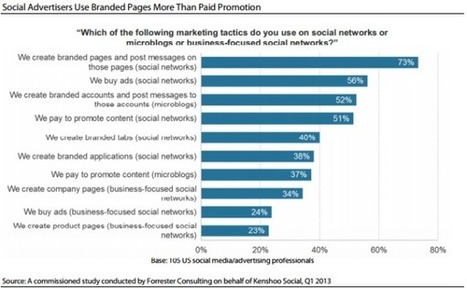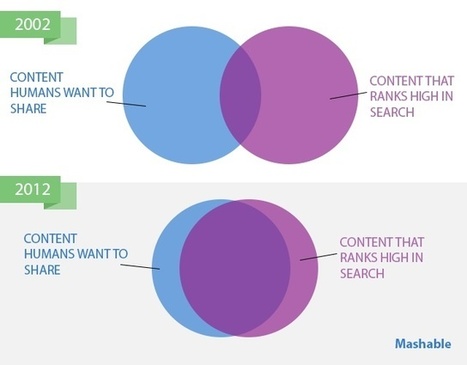Study: Organic Posting Is Most Popular Social Media Tactic, But Not The Most ...
Marketing Land
More than one in three large social media advertisers are not satisfied with their efforts from both paid and organic social media strategies.
Get Started for FREE
Sign up with Facebook Sign up with X
I don't have a Facebook or a X account

 Your new post is loading... Your new post is loading...
Five years ago, SEO was all the buzz. Today, it has shifted to "content marketing," which aims to create stories humans want to read and engage with. - The above chart is a good summary of this trend.
Via Guillaume Decugis
Martin (Marty) Smith's insight:
After writing this response to Snow's article and Guillaume's response I realized it finishes a group of 3 pieces on SEO: * Algorithms and predictive models will rule our future. * Algorithms and predictive models were always going to rule. * Google controls LESS and makes MORE. * Mobile is DISRUPTIVE in the short run.
|
Great post from @TMGmedia correctly defining the work horse of any content marketing - your BLOG.
Martin (Marty) Smith's insight:
Don't Be Fooled, Blogs Rule Influence and Conversion Social nets form a vibrating membrane of marketing communications. Social nets vibrate and bang off each other like bumper cars. Social signals are the confirming truth of the new SEO and so very important, but when it comes to conversion and sharable influence your BLOG rules. Note: yes those are Magnetic Poetry Kit words, the cool gift item created by David Kapel the gift company I co-founded brought to market all thos years ago :).M
|












The Same Message Over And Over
Social Is Different and we keep getting this message over and over. The problem / opportunity with social media marketing is it doesn't respond well to typical Stimulus - Response advertising so favored everywhere else.
Once you break the S - R curve TIME changes. When you reinforce a behavior you created it feels like you gain brand advocacy. I think you make a transaction and advocacy comes AFTER the sale.
Social media flips this response. Social media builds a relationship first, secures advocacy and then comes money. If that sounds EASTERN and not very capitalist you are right and beginning to see some of the reasons we S - R marketing pros are having such a hard time with social media marketing.
The answers are NOT to attempt to simply cart one set of tactics from paid to social. No, the answer is to form and find new ways to judge ROI vis brand advocacy and social support. Soon we will see just how much social media creates a base for success IN ALL OTHER MARKETING.
Marketers are a distrusting lot. Instead of looking hard at our efforts and preconceptions we want NEW things to walk and talk like OLD things, things we understand and trust. Life in a digital age can't afford such singular thinking.
Fuzziness prevails and the over, what we stand to gain, exceeds the under, what we stand to loose well enough to demand and open minded participation as we define the new marketing on the back of the thing we trust (paid).
I'm old enough to remember having knockdowns about paid too. There was a time when what is trusted NOW was distrusted then. Best to keep that truth close at hand since it reminds us how important ACTING and LEARNING have become in modern marketing.